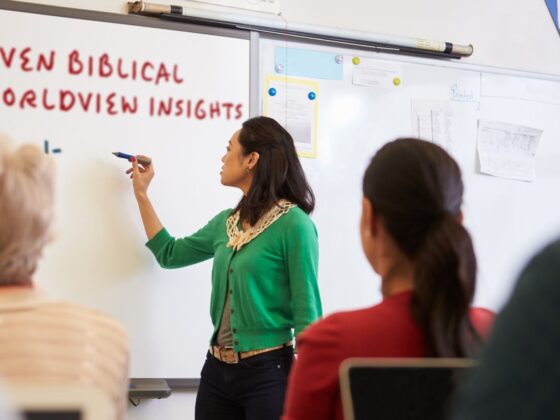Future-Proof Their Faith
September 17, 2024
Katherine Schultz
Understanding the Concern: Anticipating Future Challenges
When we look at how to develop a worldview in our students that lasts for the rest of their lives, there are several things that can cause us to be concerned about their future. Let’s put this in the context of a three-dimensional worldview. We need to address students’ beliefs, behaviors, and attitudes.
First of all, we need to understand that Proverbs 22:6 is a description, not a promise. But we do want to start our students in the right direction. Because that’s their best hope for sticking with it all through life. We’ve all heard that the vast majority of people who become Christians do so as children, so we need to reach them in this early stage of their lives. We need to plant a firm foundation and a solid faith. It’s also true that we don’t get any guarantees. Jesus taught in the parable of the sower in Matthew 13:5-6, that some who hear the word of God will be scorched and their faith will wither because it “has no root.”
Still, there are several challenges that we can identify and use as inspiration for strategies we can take now.
Strengthening Foundations: Building Resilience in Students
The first strategy we can take is to cultivate a robust biblical worldview. That means helping our students understand what they should know and believe with confidence in all aspects of life. From theology, history, doctrine, to economics, math, and biology. It also means we want our students to live out their faith, following through on what they believe with how they behave. their daily actions – both overtly spiritual and less obviously so – are a reflection of what they believe. And it means that we want our students to have attitudes that demonstrate a heart oriented toward God. We want them to worship him, to embody the faith, and to choose rituals and symbols that represent who they are in Christ.
Mentors in the community have a powerful impact on our students’ spiritual formation as well. Teachers, parents, pastors, youth leaders, family, and friends all influence how students will develop and how strongly they will hold to the faith in the future. Relationships with other people can help us understand our relationship with our heavenly Father more fully. And the closest relationships will have the most significant impact on who we are and how we develop.
A few additional practical strategies for fostering spiritual growth include regular scripture reading and memorization (Joshua 1:8), prayer (Philippians 4:6-7), and serving others (James 2:17). Encouraging these and other activities will help our students become adults who want to follow Jesus all their lives. Establishing these habits early on will influence the future choices they make.
Addressing Doubts and Questions: Encouraging Honest Exploration
In addition to establishing good habits for our students. It’s also important that we give them a place where they can ask questions and express uncertainties. We need to help them explore their faith when they’re with us, so that they have a chance to get the answers rooted in Scripture that will ground them in Truth for life. We want to help them understand scripture, learn how to study it well and know where to go when they have questions about what they don’t understand.
They don’t need to have everything figured out (Jude 1:22). Jesus made clear to Thomas the disciple who is famous for doubting his resurrection (John 20:24-29), that doubts aren’t the problem. We can help our students by constantly pointing them to Jesus and the Bible, but also by taking their questions seriously enough that we don’t do that flippantly. It’s best done in relationships! That’s where ongoing dialogue can take place.
Moving Forward with Hope: Embracing the Promise of God’s Faithfulness
Of course, there’s no guarantee. Our best hope for the future is to trust in God’s sovereignty. Only then will we find peace amid the uncertainty of what our students’ futures hold. We can help them to hold fast to the hope of their salvation by doing so in their presence now.
As Romans 8:38-39 says, “For I am convinced that neither death nor life, neither angels nor demons, neither the present nor the future, nor any powers, neither height nor depth, nor anything else in all creation, will be able to separate us from the love of God that is in Christ Jesus our Lord.”
Now What?
We are convinced of the immediate relevance of developing a 3-dimensional and biblical worldview in students so that they have a firm foundation of beliefs that they live out in their daily behavior as they continue with an attitude that orients their heart toward the Lord Jesus Christ throughout their lives.
- What Is the 3-D Worldview Survey?
- Take the 3-D Worldview for yourself
If you haven’t yet used the 3-D Worldview Survey with your class, check out the pdf below for some questions to get you started.
#futureproofstudentfaith #Christianeducation #3dworldviewsurvey #biblicalworldview #assessingworldview





